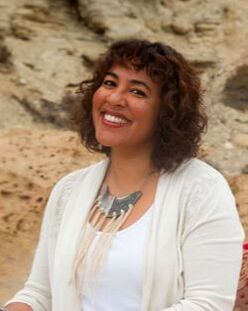|
I had such a crush on this guy when I was growing up. I was 15 at the time and he was two years older than me (which is a big age gap when you’re a wee teen). We would talk on the phone for hours about anything and everything. He had asked me on our first conversation who I liked, in that cheesy, teenager sort of way. Without giving it much thought, I said I liked him. He said he also liked me. These calls were a kind of fantasy space for me. I had girlish dreams that one day I’d marry him and live happily ever after in a house with a white picket fence in suburbia. Until one day, he casually mentioned needing to go and get a tuxedo for his prom, along with a corsage for his date. Unfortunately, the date was not me – it was another girl. I was crushed. My first real rejection in love.
I stopped talking to him, spiraling into a confused state, wondering what all those months of long phone conversations had meant and where I now stood with him. I turned my feelings of rejection into moping around my room for hours on end, finding pathetic solace in Chicago’s Greatest Hits, feeling completely sorry for myself. I felt like the poor, heartbroken victim and could empathize with all the narratives of shattered love strumming melodiously from my double deck cassette player. My best friend at the time played the rescuer, commiserating with my victim-hood, trying to help me make sense of it all, empathizing with my feelings, and allowing me a space to talk things out. Though well-intentioned, this paradigm bled into months of feeling crappy and unresolved about the whole issue, and trying to figure out ways to get him to like me as much as I liked him. It also didn’t help that I was a teenager and had to contend with the added elements of raging hormones, a still developing brain, and plots to subvert the parental empire that was designed to protect me from getting mired in such drama in the first place. After all, I should have just been studying, playing soccer and volunteering at summer camp. When we’re in conflict, it’s easy to get caught up in the age-old victim, perpetrator, rescuer paradigm. In this model, there is always a perpetrator wronging someone. There is always a victim, or the person being wronged. And often, there is someone who takes the role of rescuer and comes along and tries to fix everything. This is a common relationship paradigm and is often referred to as the dreaded drama triangle (Karpman Drama Triangle). The idea is when we are in conflict, we are taking on any one of these identities. I mean, it happens even at the most basic level in our interpersonal interactions. Oh, and roles shift within the drama triangle too. Someone can start off the rescuer and then fall into being a victim etc… But what if we could shift this paradigm? What would be possible for us then during difficult transitions, in our relationships and in our lives? One day a coach I was working with brought to my attention a most interesting diagram. It flipped this paradigm on its head from drama triangle to what is called The Empowerment Dynamic. In this paradigm, the victim becomes the creator, the perpetrator the challenger and the rescuer becomes the coach. When I learned about this paradigm, something clicked in me. I started to think about all the situations in which I felt victimized, and imagined instead creating my way forward from them. To put it in neuroscientific terms, it was as if a new neural pathway started to fire in my brain! Suddenly, those situations where I was feeling sorry for myself because something didn’t go as planned, looked different. Right away I could see the traps the old framework set up, and I started to recognize some of the narratives I had that kept me stuck instead of moving forward. Looking back on my first bout with heartbreak, I have to wonder: What if I had the ability to simply re-frame this situation? Instead of seeing my crush as the one who did me wrong, what if I could have seen him as a challenger, and see myself as someone who could create my way forward in this – be my own rescuer? How empowering and different an experience this might have been for me. For example, I might have started being curious and created some questions to ask him. Maybe, “Oh I’m curious – why did you take her to the prom and not ask me?” Or maybe I could have spoken to him and created the space for a kind friendship to ensue in the future, one that wouldn’t necessarily warrant talking on the phone for hours on end. I didn’t realize it, but at the time, I was being challenged to set boundaries, get clear on my feelings (a skill that would become so important to me later in life), and to step out of my shyness into confronting one of the things I dreaded most – the feeling of not being worthy of one’s love. I was never taught to communicate like this let alone share my feelings – when ever are we at that age? Would I still have been as disappointed knowing I wasn’t the one? Maybe so. Would it still have been hard? Yes. Would this have even been possible at the tender age of 15, with a barely developed brain (remember the adolescent brain doesn’t fully develop until our mid-20s’, and in some cases it takes until age 30)? Who knows? But it would have built a new neural pathway for me to practice getting clarity, a skill which would eventually prove to be extremely valuable in all of my future communications, whether personal, romantic or professional. When things are clear, at least you can heal and set your own direction forward for freedom. I also probably wouldn’t have fretted so much, feeling like I fell short in some way. I might have began to understand my worthiness and might have even gained a good friend. So what if we could cut the teenager out of us, whose delusions of love didn’t go as planned, and see ourselves as creators in conflict instead? Rather than stay stuck and hurt in a situation that didn’t go the way you wanted it to go, how do you create forward movement? Or, I guess the more powerful question is: What narrative do you need to let go of that’s holding you back? What’s the new narrative you dare to create? Back to the teenage crush. After a few years of not speaking, I ran into him when he was back home visiting from college. Out of nowhere he apologized for his behavior, for not being up front and for the impact it had had on me. I heartily accepted his apology, and it felt like such a relief to clear the air. Looking back at this experience through the empowerment dynamic, where I’m the creator (and well, coach – the coach being the one who asks powerful questions and lets you figure it out on your own vs. saving you and solving problems for you) and he was the challenger, I can shift my narrative. Teenage heartbreak wasn’t about whether something did or did not materialize fully into something; it was about necessary experiences I needed to have in service to my full spiritual evolution. These are the type of experiences that would deliver lessons in understanding, non-attachment, forgiveness, and an even greater capacity for me to hold love for others and to realize my worth. They were also necessary to help me eventually understand the qualities I needed in others that would bring out the best in me. Being disappointed early in life is fuel for learning, and gives us the opportunity to reflect and to set ourselves up for greater success the next time around. We will always face challenges on our journey, in our transitions and in our relationships. We may not have power over what happens to us. But we do have power over our own personal narratives and how they are framed. We can keep one narrative and be stuck in it, or we can choose to re-frame it. I guess that’s why victims of very bad incidents re-frame themselves as survivors. There is something so much more powerful about that label, one that connotes an heir of creating and thriving as opposed to suffering and blaming. In my work as a coach, I speak to many people in profound transition – those who have gone through a tough divorce after 20 years of marriage, competent executives who have had painful and unexpected breakups with their employers, and those who veer off an old path to venture onto a new one, terrified that they aren’t going to come out on top. When they turn to, “But it can’t work because of this …” or, “In the past, this is what happened …” and I sense that they are stuck, I challenge them to see themselves as a creator instead of a victim, and ask what part of their own narrative or limiting belief needs to be rewritten. I don’t mean to say processing real feelings is not a necessary part of our work. It is in order to fully heal. But once the feelings are processed, I ask, “What would you want to create going forward?” and “How would you do it?” It’s surprising to see what new narratives emerge, the new insights, the new way of seeing things, and the gratitude for understanding the purpose in their greater spiritual evolution. Think about the narrative you might be living in now. Where are you the victim, the perpetrator, or perhaps the continuous rescuer? How would you rewrite this narrative as if you were the creator, challenger, or coach? I challenge you to do this. I bet you’d be surprised at what you could create if you tried. Like What You Read? Sign Up for My Monthly E-news!
3 Comments
Michelle
10/14/2016 11:02:48 pm
Discovered this gem of truth and beautiful, heartfelt piece by accident...No---this discovery is a blissful coincidence :=) Just what I needed to hear as I move forward in the biggest lifestyle transition of my life. Left my job of nearly 14 years and relocated to another region of the country where I know only one person to start a new business with no related skills in that field whatsoever and no steady income. The risk taking you describe reflects a lot of our mutual love for water and water sports; to be a great surfer you have to have a lot of trust of water and oneself to stay up! My faith has been tested like never before, but God has blessed me and protected me in spite of my grieving, disillusionment, despair, and loneliness during the lengthy process of change! Your words are extremely inspiring and empowering. Praise God for you and your healing, and how it is reaching many. Thanks for sharing!
Reply
Farhana
10/16/2016 05:17:46 pm
Thanks Michelle for your comments. Congratulations to taking such a big leap - super super courageous of you! You are right - trust in the water but most importantly, oneself is paramount. Sounds like you are aligned and moving forward to amazing, new spaces! Good luck with everything!
Reply
Leave a Reply. |
AuthorFarhana Huq Archives
June 2023
Categories
All
|
Copyright 2014-2024 Surf Life Executive Coaching



 RSS Feed
RSS Feed